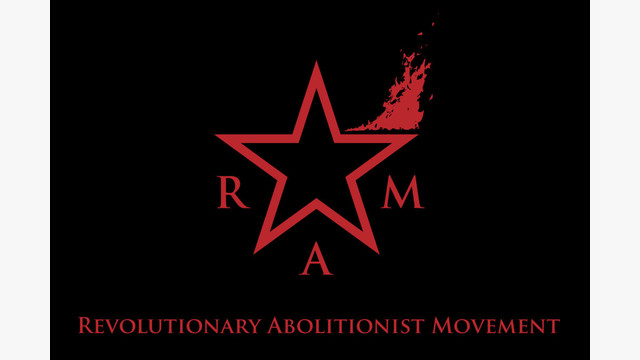Secondly, our long-term vision must be to abolish the state itself.
The overarching scope of our struggle must focus on building abolitionist counter-power and helping people escape the plantation. While we fight to abolish prisons and the state structure, we must unequivocally fight alongside those who are now the target of state violence, with the intent of ending the entirety of this heinous system.
The basic focus of our struggle:
1. Take up the immediate fight to abolish prisons, courts, and ICE detention facilities.
2. As Abolitionists, we must fight unequivocally with Black, Latino, Native, Muslim people, and all those subjected to prison society and white supremacy.
3. The struggle must be feminist, and predicated on queer and trans liberation.
4. The Abolitionist struggle must fight for decentralized, commune-based political organization, and stand resolutely against capitalism and the state.
5. The struggle must be orientated toward militant self-defense, and devise specific plans for offensive actions against reactionary forces.
6. The Abolitionist long-term goal is to get rid of the justice system, the nation-state, and the capitalist economy.
We must defend people from captivity as well as our political centers, we can not be on the defense indefinitely. The state is in a weaker position today than it has been in decades. The moment we act is up to us. "The secret is to really begin."
Pittsburgh is home to a wealth of anti-authoritarian groups & projects. We hope to deepen the local scope of these groups by tying the actions to neighborhood self-governance, and a larger political project. Connecting the projects to each other by increasing resources, participants and deepening our commitments to revolutionary political solutions.
Strengthening connections between projects helps reinforce each one and builds up pragmatic resources and defense. Revolutionary initiatives and projects form new political and social relations base on mutual aid and neighborhood self-sufficiency.
The most essential tasks are to create the ideological underpinnings for revolt and the necessary infrastructure that can sustain action and long-term organization.
An overarching political objective is absolutely necessary. In order to go on the offensive, groups need a foundational reason to act, to liberate individuals, to liberate new territories, or weaken the state
We seek to tie pragmatic feminism into the larger abolitionist framework whose main pragmatic purpose is to help those fleeing oppressive situations and state repression, while forming a militant wing to help protect this political project.
The process of undoing gender roles can be viewed as similar to the process of dismantling the carceral state. Putting self-defense at the origin of this process has the potential of both building strength and uprooting stagnant roles.
When people have the opportunity to autonomously defend themselves, and fight for others, the nomativity of fixed identities are called into question, and the process of abolishing gender, and creating a fluid world of self-determination becomes possible.
This opening necessitates larger political organization. With revolutionary defense tied to the origins of this project we can begin fighting for the diffusion of power, and as power is diffused, new possibilities arise with a proliferation of identities.
Anarchists and other revolutionary groups have already began self-defense classes, queer gun-clubs, and rapid response networks for transpeople. By tying these projects to a broader revolutionary mission, multiplying their efforts by training new complementary units, placing them at the center of social organizations and creating the avenues for mutual support, we can build viable self-defense and the capacity to release others from bondage.
It is impossible to speak about resolving social conflicts in the U.S. without addressing the agents of the State and reactionary, racist forces, and their consistent use of terror to maintain their social and political position.
No platform, no dialogue, no inch of territory, and certainly no concern can be ceded to those who either threaten or unleash authoritarian, white supremacist violence. As the Italian anarchist Alfredo M. Bonanno has eloquently put it, "The life of someone who oppresses others and prevents them from living is not worth a cent!"
Revolutionary change will not come as a singular event, nor an immediate exchange of power, but an ongoing struggle to free us all from the bonds of oppression and distribute power to communities of resistance. The illusion that a small group can seize state power and enact the will of the majority has dried up in the gulags, prisons, and killing fields of nation-states around the world.
Within the scope of the Abolitionist struggle, it is essential to work towards a long term liberatory solution. The legacy of previous struggles in the U.S. demonstrates that our need for new methods of revolutionary organization must be built deliberately, completely outside the caceral apparatus of the state, and grounded in the predominant conflicts in the country. Our projects integrity depends on whether it is rooted in destroying the slave-state, revolutionary decentralization, and vigorous self- defense to prevent other political forces from subsuming or defeating us.
Revolutionary communities must exemplify the new socio-political relationships that they seek to create in society at large.
By laying proper political frameworks both in terms of practice and ideology, revolutionary groups today have the capacity to turn the tide of spontaneous revolt into something that can sustain itself. If successful, we will inspire others to acts of revolutionary justice and self-liberation, initiating participation in building the political foundations of the future.
The revolution will build the revolution!

No comments:
Post a Comment